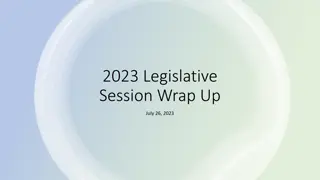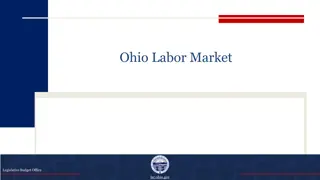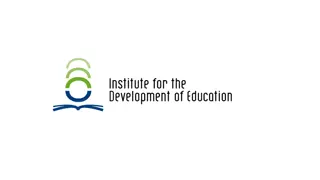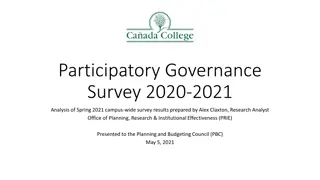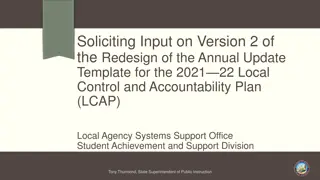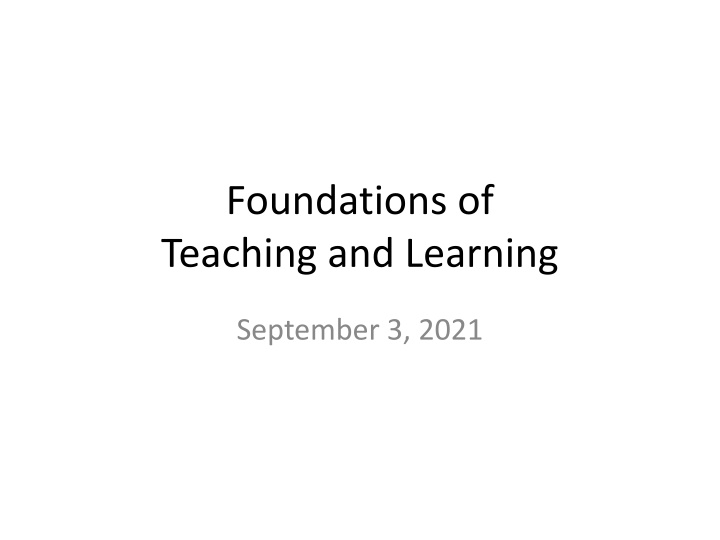
Foundations of Teaching and Learning Seminar: Course Overview and Requirements
Explore the educational journey in EDUC 616, delving into diverse perspectives on teaching and learning, with a focus on philosophy, theory, and practical application. Engage in blended learning formats with class discussions and forum participation. Stay on track with readings and assignments for a comprehensive learning experience.
Download Presentation

Please find below an Image/Link to download the presentation.
The content on the website is provided AS IS for your information and personal use only. It may not be sold, licensed, or shared on other websites without obtaining consent from the author. If you encounter any issues during the download, it is possible that the publisher has removed the file from their server.
You are allowed to download the files provided on this website for personal or commercial use, subject to the condition that they are used lawfully. All files are the property of their respective owners.
The content on the website is provided AS IS for your information and personal use only. It may not be sold, licensed, or shared on other websites without obtaining consent from the author.
E N D
Presentation Transcript
Foundations of Teaching and Learning September 3, 2021
Welcome to EDUC 616: Foundations of Teaching and Learning Seminar-style course where we ll discuss several perspectives on what learning and teaching are and should be Connecting these perspectives to philosophy and theory on the nature of design and inquiry I hope you ll come away from this class with an appreciation for what each of these perspectives brings to the discussion and broader field
Format Blended reading/lecture/discussion Discussion in class and on discussion forum
Do the readings I know there s a lot of readings You will get a lot less out of this class, if you skip the readings You also won t do as well on the assignments
Course times Friday 630am-820am Early for some, late for others
Course Prerequisite None
Assignments Reflection on your own learning 15% Already posted on course website Due September 13 Learning Theory Matrix 10% Due October 4 Applying Theory to a Contemporary Educational Problem 25% Prospectus Due October 18 Paper Due November 15 Analysis and Revision of Learning System 25% Due December 20 Participation 25% In-Class Participation 10% Discussion Forum Participation 15%
Required Books Vygotsky, L. S. (1978). Mind in society: The development of higher psychological processes. Needed for class September 24 Dewey, J. (1938/1963). Experience and education.
Other Readings Available at LINK
Extensions? In this class, we will be engaged in an ongoing discussion about assignments Therefore extensions for the assignments will only be available in case of instructor error or extreme circumstances (assignments in other classes, research studies, and so on do not count as extreme circumstances; serious injury, illness, COVID quarantine, or death in the family do count as extreme circumstances). Outside of these circumstances, late hand-ins will not be accepted (e.g. zero credit will be given).
Where to find stuff Course discussion forum piazza.com/upenn/fall2021/educ616 Course website https://www.upenn.edu/learninganalytics/rya nbaker/FTL2021
Discussion Forum Will be incorporated into participation grade, along with class participation Just showing up to class and sitting silently does not count as class participation If you have a question for me that is not completely specific (e.g. why did I get a B?), please post it to the forum I get hundreds of real emails a day, I will read the forum first
Discussion Groups You will be placed in a Piazza discussion group, after today s class I wanted to see who would actually come to the first class Each week you will be provided several prompts related to the readings. Once you have completed the readings, you will write a short, informal response to one of the prompts (1 to 2 paragraphs) Your initial post is due 24 hours before your class session Please respond to the posts by your group members before class time In preparation for the class meetings, you should read the responses posted by others in your discussion group
Ways to get in touch with me Post to the forum Strongly preferred for all questions that could be of interest to other students Come to office hours, 4pm-5pm Wednesday (at bluejeans) Set up a meeting penn.learninganalytics@gmail.com Questions on grades, being late, or missing class ryanshaunbaker@gmail.com Use the right approach, get a much faster response
Introductions Everyone please Say your name Say what program you re studying in Say what your current job is (if you have one) Say why you re interested in the material in this class (if you are) Say what you hope to be doing in 5 years
What we will study this semester 1. Exploration of major theories of learning, theorists that introduced them, and their implications for practice 2. Examine several pedagogical frameworks and perspectives and their implications for educational practice 3. How emerging technologies shape modern learning 4. Social factors and phenomena that influence and moderate learning in context.
What we will study this semester To the syllabus!
Where do different theories come from? Different theories conceptualize learning differently They also come from different philosophical assumptions about how to construct theory itself The difference phenomena we choose to study are dependent in part on the way we look at meaning itself
Buchanan and McKeons Framework Ways to design The cross of pane
Dick Buchanan Founder of journal Design Issues Inventor of term wicked problem Key theoretician of design in the 1990s and the first decade of the 2000s
Richard McKeon Key 20thcentury philosopher Referred to as the Evil Professor by Robert Pirsig in Zen and the Art of Motorcycle Maintanance
Buchanan and McKeons Framework HOLISTIC EXISTENTIALIST ESSENTIALIST ENTITATIVE
Buchanan and McKeons Framework HOLISTIC EXISTENTIALIST ESSENTIALIST ENTITATIVE
Buchanan and McKeons Framework HOLISTIC EXISTENTIALIST ESSENTIALIST Includes both Cognitivism and Behaviorism ENTITATIVE
Buchanan and McKeons Framework HOLISTIC EXISTENTIALIST ESSENTIALIST You can understand things in themselves ENTITATIVE
Buchanan and McKeons Framework HOLISTIC EXISTENTIALIST ESSENTIALIST You can understand things separately from their contexts ENTITATIVE
Buchanan and McKeons Framework HOLISTIC EXISTENTIALIST ESSENTIALIST Individuals learn skills and concepts ENTITATIVE
Buchanan and McKeons Framework HOLISTIC EXISTENTIALIST ESSENTIALIST Key method: REDUCTIONISM ENTITATIVE
Buchanan and McKeons Framework HOLISTIC EXISTENTIALIST ESSENTIALIST We can understand complex phenomena by understanding their parts and how those parts interact ENTITATIVE
Buchanan and McKeons Framework HOLISTIC EXISTENTIALIST ESSENTIALIST Emergent phenomena can be understood by first understanding the motivating factors and processes ENTITATIVE
Entitative Thinkers HOLISTIC EXISTENTIALIST ESSENTIALIST AndersonSimon Koedinger Bloom ENTITATIVE
Buchanan and McKeons Framework HOLISTIC EXISTENTIALIST ESSENTIALIST ENTITATIVE
Buchanan and McKeons Framework HOLISTIC Called the ontological approach by Buchanan, and Gestalt by others EXISTENTIALIST ESSENTIALIST ENTITATIVE
Buchanan and McKeons Framework HOLISTIC In education, called Situationalism or Activity Theory or Social Cognitivism by its friends EXISTENTIALIST ESSENTIALIST ENTITATIVE
Buchanan and McKeons Framework HOLISTIC Things can only be understood by understanding the systems they operate in EXISTENTIALIST ESSENTIALIST ENTITATIVE
Buchanan and McKeons Framework Learners are enculturated into practices that communities agree are correct HOLISTIC EXISTENTIALIST ESSENTIALIST ENTITATIVE
Buchanan and McKeons Framework HOLISTIC Complex phenomena must be understood as wholes; they can not be understood in terms of their component parts EXISTENTIALIST ESSENTIALIST ENTITATIVE
Buchanan and McKeons Framework HOLISTIC Emergent phenomena must be understood in themselves EXISTENTIALIST ESSENTIALIST ENTITATIVE
Buchanan and McKeons Framework HOLISTIC Key method: DIALECTIC EXISTENTIALIST ESSENTIALIST ENTITATIVE
Buchanan and McKeons Framework HOLISTIC Truth is found through the struggle of opposing hypotheses and their eventual unification in a richer synthesis (Hegelian-Kantian dialectic) EXISTENTIALIST ESSENTIALIST ENTITATIVE
Buchanan and McKeons Framework HOLISTIC Truth is found through positing overly abstract hypotheses, finding evidence that negates them, and coming to a newer concrete theory (Hegelian dialectic) EXISTENTIALIST ESSENTIALIST ENTITATIVE
Buchanan and McKeons Framework HOLISTIC Change is governed by historical properties (historicism) where contradictions and states repeat themselves but in continual refinement (material dialectic) EXISTENTIALIST ESSENTIALIST ENTITATIVE
Dialectical Thinkers HOLISTIC Pirsig Lave Vygotsky Freire EXISTENTIALIST ESSENTIALIST ENTITATIVE
Another key dimension Is there a reality out there that we want students to learn about? Are we just teaching cultural practices, or are we teaching real things?
Buchanan and McKeons Framework HOLISTIC EXISTENTIALIST ESSENTIALIST ENTITATIVE
Buchanan and McKeons Framework HOLISTIC Doesn t really have a name that its friends call it, in education EXISTENTIALIST ESSENTIALIST ENTITATIVE

